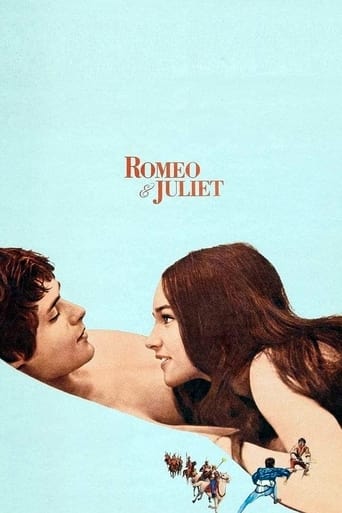patanellar
Because it was required by my school. I never understood how this film was remade, because aren't films that are remade supposed to be good? One good thing came out of this-I got to call Romeo a sexist womanizing playboy in my essay about this. Why? Because he clearly is.
sharky_55
It begins and ends with Leonard Whiting and Olivia Hussey, who are the star-crossed lovers through and through. Juliet is thirteen in the play and Romeo barely older, and the fresh-faced pair descend to that level in their words and actions. Most stage productions use adults, with good reason; they understand the stress and the meaning behind each line, the sly wordplay and the literary allusions, while teenagers are still groaning in English class. Yet Franco Zeffirelli knew that a film's fidelity to the original did not have to be complete. He cuts some brilliant lines (generations of young Romeos have compared Juliet's eyes to the stars in the sky) and some superfluous ones, but what remains is the pair's boundless and foolish passion for one another. Watch them come together again in the church to be married, some mere hours after their last meeting, yet they fling themselves at each other and kiss like two ravenous birds, and have to be pried apart by Friar Lawrence. Observe the breathless delivery of their dialogue, always rushing to get to the next line, the next kissing segment. They have no eyes for rhyme or verse, only for each other. The more traditional of the students of Shakespeare may find this blasphemous, but then there are countless dramatic interpretations of the full text for them to savour. What Zeffirelli's film finds is what can't be captured in shabby costume and flat backdrops, of a living, breathing Verona awash in sweat and dust and colour. The cinematography of Pasqualino De Santis captures a city drenched in heat and the fiery passions of two feuding families, with foreheads shimmering in the sunlight with sweat and sharp shadows so alive they almost seem to kick at the dust themselves. Danilo Donati's costumes likewise punctuate the frame with a vividness that matches the brash personalities - Tybalt is all crimson and bright orange to go with his bronzed skin and piercing blue eyes (a missed opportunity here for Mercutio, however). And Nino Rota's famous theme flares up with the same intensity as that of the young lovers, climaxing in a scene at the party so lush and terribly romantic it almost renders the first exchange of rhyming quatrains unnecessary. Romeo is the link between violence and sensuality, between the dusty, earthy day and the serenity of night, although the latter lacks the visual imagination of the former. Shakespeare's antithesis of light and dark makes up many of the crucial images of the play: the flash and sparkle of a lover's eye, the sun and moon as beauty and terror, the seductive and morbid blackness of the wedding bed and then the tomb. Zeffirelli may have taken care to shoot on location as much as possible, and yet the balcony scene reeks of studio lighting, and a dull darkness. In one moment Juliet tightly grasps Romeo's hand and swears her love, and De Santis frames a tiny sliver of moonlight so that it hits only her gleaming eye, full of wonder and hope and adoration. This is offset by the constant top light which illuminates the entire frame in a way that removes much of the allure of the situation. Zeffirelli compensates in other ways; Romeo may be waxing lyrical about Juliet's eyes, which shine brighter than all the stars in all the heavens, but what is also in centre frame? Her porcelain skin, and the hint of cleavage accentuated by the plunging neckline of her bodice. The physicality of the attraction is underlined, and the burgeoning youth of the performers is once again made crucial. This physicality is mirrored in the masculine feuds out on the sun-baked streets of Verona, where the Montagues and Capulets swipe at each other until a blow turns deadly. It is here that Zeffirelli perfects the comedic swagger and flamboyance of Tybalt, Mercutio and their hordes, and how to channel that playful energy into wrath. The camera is perched right in the very midst of their quarrels, spinning dizzyingly as if on a carousel, and then suddenly a blade is bloodied, and a frantic, Peckinpah-esque zoom draws attention to the story's breaking point. Beforehand there is the same dizzying zeal in the boys' bawdy exchanges with the nurse, who scolds Romeo's company but can't help but grin at his wordplay all the same (she's of a lower class, speaking mainly in prose). She's portrayed by Pat Heywood with springs in her feet, bouncing and beaming from scene to scene, providing the comedic flourishes that Shakespeare wields to further drive the inevitable tragedy. The nurse exemplifies the swelling exuberance of the entire film, as do Mercutio and Tybalt, and Romeo and Juliet, who must bear the mantle of the greatest love story of all time. We are all familiar with their demise, although we often forget that they were merely teenagers. But Zeffirelli remembers.
irelynjadeosborne
"Romeo and Juliet: Dear Lord have they killed themselves yet?" ☼☼☼☼☼ 1 star In "Romeo and Juliet," two very young lovers find each other in the middle of a big mess. Even though they are destined for doom, they decide to take their chances with fate. You should probably just watch the last ten minutes; it explains that whole point of the story. To start, you don't even see Juliet for the first half hour of the movie... isn't this called Romeo AND Juliet? They finally introduce Juliet to Romeo at a party one night. Okay, it's going good so far. Immediately after the party, Romeo is already sneaking onto Juliet's property and spying on her. He decides to call her name even though it was dark outside and it probably made her scared for her life. They start talking, and five minutes later... BAM... they're in love. On the plus side of this story, they meet two whole times before getting engaged, not to mention the fact that he proposed to her through her nurse. Not even a phone call? Ouch! At least he didn't drag the engagement out for a whole 24 hours. Meet one day, and married three days later is totally normal. Weird? Only a little. Hold up, now Juliet's engaged again? Wait, but I thought... never mind. So wait her parents don't know that she's married? I mean the least she could've done is let them know, maybe invited them to her wedding? What's next? She's dead. There's a plot twist. SIKE, she's only pretending to be dead to get out of her new engagement. To be honest, it makes sense. Someone should tell Romeo that plan. Too late, He's already killed himself. Seriously, did nobody see that coming? Hey look, Juliet's awake! That's coincidentally timed. Oops, I blinked and now she's dead too. Funny how that stuff happens. Wait that was the whole movie? It took you two-and-a-half hours just to tell me that? Overall, this movie is not worth your time or money to see, as I just explained the whole movie. (Sorry if there are spoilers, but let's be real, you already knew they died.) I didn't like this movie because on top of the fact that it made no sense at all, it wasn't even in English. Wait that was English? Please excuse my mistake. However, you may need a 16th century translator in order to understand it, if those are even around anymore. Although I'm pretty sure they went out of business in 1601. Anyways, overall, it is not worth the effort to go and see "Romeo and Juliet."
rsd_anon
I haven't seen this movie for 40 years. I had always remembered it as a great movie. I had been waiting for a Blu-ray version, but I finally gave up and decided to see the DVD version.The movie was a mixed bag for me. I still love the sets and most of the acting. The audio, however, was so bad that it seriously distracted from the movie. If the audio was equal to the sets and acting, I would raise my rating to a 9. As it is, I can only give it a 6.There were three things that were particularly bad. First the speaking parts seemed to have all the bad quality of a dubbed movie. It appears that the actors were all speaking in English, but the soundtrack sounded as if it was all dubbed. All of the speaking parts reminded me of "The Good, the Bad, and the Ugly". The second problem (for me) was the overly emotive sobbing of Juliet throughout many of her scenes. Again, it was if the scenes were filmed and then the parts were spoken later in a recording studio. Maybe this is the way all movies are made, but it was bad enough to make me cringe each time Juliet started the sobbing. The third problem was the use of orchestra music in the background of many scenes. This may just be the norm for 1968-era movies, but it now sounds wrong.







